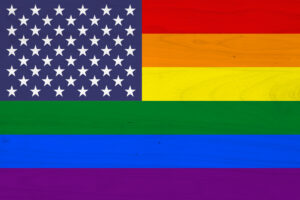
The Needs of Gay Men in the Volatile “LGBT” Era
A couple of years ago, I wrote about some concerns I had overall about the gradual adoption of “LGBT” (or its variants like LGBTQ, LGBTQ+, etc.) as the umbrella term for referring to all sexual and gender minority persons in society (that article is here https://gaytherapyla.com/gay-therapist-discusses-the-problem-with-lgbt-language/ . I was concerned that this term, in its efforts to be all-inclusive, diluted the needs of the populations that those individual letters represent, such as lesbians, gay men, bisexual women, bisexual men, trans men, trans women, non-binary, etc.. I follow up on that today, because my concerns persist, to discuss in a mental health, well-being, and activism context during this current Pride 2021 season.
In the previous article, I mentioned how the umbrella term of LGBT+ empowers on the one hand by bringing these populations together as a significant and important segment of society, worldwide, and certainly as an important voting bloc in the United States. Perhaps the strength of this term, and our collective LGBT+ increased visibility, has led to things like corporations falling over themselves in the past couple of years to appear (key word, “appear”) supportive of their LGBT+ customers during the June Pride season (although, these same companies have been taken to ask for painting their logos and marketing materials awash in rainbow colors for the public, while behind the scenes donating a collective millions of dollars to decidedly anti-LGBT political candidates, in perhaps the original epitome of “actions speak louder than words”).
My concerns about using exclusively “LGBT+” instead of discussing the people within these populations that the letters represent include the idea of specific advocacy and visibility, and the specificity of attention and professional services, like therapy, coaching, medicine, and law. By “lumping in” all gay men, lesbians, bisexuals (of all genders), pansexuals, nonbinary people, trans feminine, trans masculine, intersex, etc., we “reduce” the social, political, psychological, and well-being needs of these variations to one umbrella term that is at risk, collectively, of being dismissed by the majority. This is not unlike the dangers of using “people of color” or the more recent BIPOC (black and indigenous people of color) terminology, instead of noting, importantly, the very different needs of those who are black, Hispanic (which is in itself too broad; does that mean Mexican, Costa Rican, Argentinian, Peruvian, Honduran, etc., etc.), Asian-Pacific Islander (again, broad: Japanese, Chinese, Korean, Vietnamese, Laotian, Thai, Samoan, Fijian, etc., etc.). My previous point was that while we can form a certain “powerful bloc” by using LGBT+ of all sexual and gender minorities, where “the whole is greater than the sum of its parts,” we also lose the importance and power of specificity.
 Professional Services
Professional Services
I am a long-term (29 years in 2021) specialist psychotherapist and life/career/relationship/executive coach, and AASECT Certified Sex Therapist, specializing in gay men. I also say, of “LGBT,” I specialize in the “G”. This is because I wouldn’t presume in one lifetime (or certainly one career, even in decades) to say that I can equally address the men’s psychology needs of gay men, and the women’s psychology needs of lesbians, or of all the LGBT+ populations equally (although I see some clients of each of these categories). My concern is that in trying to serve everyone, we really serve no one. This is the great risk of generalist therapists.
Educational seminars can be this way. I recently saw an ad for a seminar on “sex therapy with the LGBT population.” I find that absurd. Few psychotherapists (despite broad assumptions to the contrary) get any education in sexuality, sexual health, and sex therapy topics, including “marriage and family therapists,” whose very name would imply they could help a couple with sex therapy issues, when they can’t, because either the therapists don’t want to learn and apply this material (which is rampant), or they can’t, because they haven’t sought meaningful additional training beyond their Master’s program. And it’s the same with clinical social workers, professional clinical counselors, psychologists, psychiatrists, and the related mental health disciplines that vary from state to state, and country to country. Even as an AASECT-Certified Sex Therapist, I don’t claim or presume to be able to assist cisgender women’s sexuality in the same depth and nuance as I could cisgender men, based not only on education and experience, but also being a “penis owner.” There is something about the “LGBT” terminology that sounds arrogant to me, especially when it’s used in a three-hour seminar title. You could have a three-hour seminar on “just” gay men, “just” lesbian women, “just” bisexual men, “just” bisexual women, “just” trans men, etc., and that still wouldn’t be enough education to really serve those populations in sex therapy in the manner they deserve. To get anywhere close takes years of focused education and experience.
It’s not just about how things like educational seminars are titled and marketed, either; this includes books, articles, webinars, and really all informational products, or even when I see psychotherapists and coaches advertise this way, as being “LGBT.” Unless they have specific, individual providers who have training and experience for each of these populations, it becomes the “jack of all trades, master of none” thing, that ultimately under-serves clients and the public.
So when my therapy and coaching for gay men specialty practice focuses on gay men, it’s because there are specific needs of the gay male population, and this includes clinical/personal issues as well as the political and psychosocial. For example, one challenge I see in the overall “LGBT” movement is that in an attempt to “right the wrong” that lesbians and trans people have in the past been largely ignored and overlooked by major institutions, including “gay and lesbian” organizations, there is a very strong emphasis on trans women, especially trans women of color. The implications of some articles, documentary films, TV shows, etc., seems to imply that cisgender gay men (especially white ones) are just as much “part of the problem” as conservative Republican politicians who vote against all minority rights with alarming consistency and actual “effectiveness” in keeping us unequal and oppressed, year after year. Gay white men (and even more so, those who are HIV-positive) are, indeed, a social minority that is subject to stigma, discrimination, “gay bashing,” school bullying, workplace bullying, street assaults, sexual assaults, hate crimes, and murder; they are still a vulnerable minority population. This is not necessarily so for straight white men. While women of color, especially trans women of color, are assaulted, raped, and even murdered in greater numbers than cisgender white gay men, I think we get into real trouble when gay white men are seen as so privileged that they are part of the problem instead of part of the solution.
But this is not a contest, just like it’s not a contest among racial and ethnic minorities to compete for who has been the most historically oppressed (slavery versus the European Holocaust has been a topic I’ve seen debated for years, pitting African-Americans against American Jews, in a vulgar display of both racism and anti-Semitism, all with the support of the White Straight Male Oligarchy as part of their overall strategy to maintain power (quite effectively, unfortunately). Activist friends of mine, and other authors, have implored all social minorities for years to find common ground against the White Straight Male Oligarchy, and we saw in the 2020 elections how effective that can be when minority populations band together to fight for our social and legal equality and rights, versus being splintered. Biden would not have won Georgia, for example, without the LGBT+, Black, and women voters coming together as one, and there is a real lesson there in actual election outcomes. For our rights to be achieved, we all have to work and fight for them, because let’s face it, the “other side” is working probably harder to deny us. They are highly motivated to oppress us; in fact, they see it as literally their Divine Duty. The fate of your eternal soul (as they see it) is a pretty strong motivation to vote to oppress, hate, and in many cases, kill.
So while I’m not suggesting that the LGBT+ community go back to the days when gay white men ruled the sexual and gender minority population, and lesbians were clearly “put in the back seat” in terms of having a collective voice, and certainly trans people (especially trans women, and of color) were ignored, I am saying that each of the sub-populations within LGBT+ needs its own specific addressing of needs in order to thrive, individually first, then collectively.
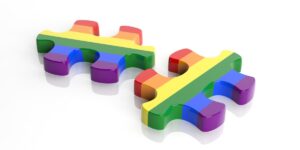
The Specific Needs of Gay Men’s Well-Being
For example, gay men live with some conflict. On the one hand, we are minorities subjected to the social ills I mentioned earlier. But we also have male privilege, especially White Male privilege. It would be an incomplete understanding of the population if we didn’t acknowledge the duality of both social privilege and minority status. But this might be true with others who have some kind of privilege: Caitlin Jenner is a trans woman, but is also, by any world standard, extremely wealthy and has class privilege and the privilege that comes from being world famous for decades, which is why she gets criticized for apparently being more loyal to her fellow greedy Republican Americans than she is to anything related to the LGBT community; in fact, she actively works against the LGBT community by aligning herself with politics that exploit minorities, including being against trans girls participating in girls’ sports, in a direct pandering to rich Republican voters, who probably wouldn’t support her anyway. Oprah Winfrey is a woman of color and rumored to be a lesbian, yet is one of the richest women in the world; that’s still privilege. We get into trouble when we say that gay (white) men are “part of the problem,” when we, collectively, have countless examples of minority oppression as the victims of anti-gay crimes, both physical (hate crimes, gay bashings, murders) and “white collar” (such as discrimination or workplace bullying).
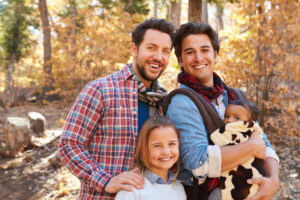
So, perhaps it’s time to remind ourselves that gay men still have needs, even in the current era of these specific needs being diluted. Politically. Socially. Mentally. Physically. Professionally. We’ve considered the political and social, above; let’s look at the others:
Mentally – Gay boys grow up knowing some male privilege, and perhaps we benefit from this without knowing it, as people with privilege generally do. However, because we don’t always conform to the gender norms and expectations of peer “males,” we get punished for it. Boys who aren’t in the mold of their fathers? Punished for it. Boys who have interests outside of their straight peers? Punished for it. Boys who don’t play sports? Punished for it. Boys who aren’t “rough and tumble”? Punished for it. Boys who don’t present with strict “masculine” (for a nine-year-old?) clothing? Punished for it. Boys who don’t “take their rightful place to sexually dominate girls”? Punished for it. Boys who are drawn closer socially to female peers than male peers? Punished for it. That doesn’t sound like privilege to me. As boys or men, the mental health needs of gay men at any age include the usual human needs for love, support, acceptance, validation, safety, inclusion, fairness, and (from Albert Ellis, PhD) “unconditional positive regard.” We need these supports from parents, siblings, peers, teachers, coaches, bosses, coworkers, and politicians. Gay men are not automatically “perfect on their own” without support just because we have male privilege.
Physically – Gay boys and men have their own specific medical care needs that differ from straight men. Sexual health might include concepts that all penis-owners have, such as not to have “dick drip,” but gay men have sexual health assessment and treatment needs that differ from straight men, and yet many (most!) physicians, nurses, and other providers (including social workers, I might add) are woefully ignorant about these. Proper medicine includes LGBT+ affirmative medicine, and that includes more specifically gay male affirmative medical practice, such as anorectal health and substance use Harm Reduction.
Professionally – I’ve seen gay men who are the beneficiaries of white, male, class privilege in professional settings, and that can be part of the “machine” that forces straight women, lesbians, and trans women, women of color, and others into “secondary” roles, and that’s a problem in the American workplace. However, gay white men still under-earn their straight white male counterparts, and while the “gender pay gap” remains a problem, the “sexual orientation pay gap” is a problem overall as well, for all sexual minorities. I do a lot (and I mean a lot!) of professional coaching for gay men’s careers, and I constantly observe how the social oppression of gay men leads to them undermining their self-esteem in a way that stymies reaching their full professional potential. The “old boys network” is forgetting to mention and add that it’s the “straight old boys network.”
Again, I’m not saying it’s a contest to see who among us in the LGBT+ community wins some kind of prize for being “most oppressed” and therefore must be deemed superior to all others; that’s a “divide and conquer” strategy that anti-LGBT politicians (aka, Republicans) would just rub their hands together with evil glee to see, because it undermines our movement and renders us politically impotent . But I am saying that any non gay white male person in the LGBT+ broader community that dares to say that “gay white cis men” are “part of the problem” is invalidating the very real (even traumatic) experiences that gay men face, and that I’ve helped these guys with over my long career as a gay men’s specialist, and even my own experiences as a gay, poz man, who has been the victim of multiple crimes. And that’s not right, just as it’s not right for gay white men to dare to speak for “all” in the LGBT+ community.
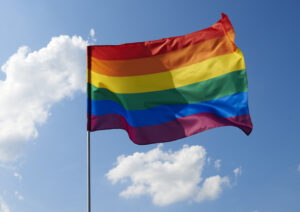 The recent TV mini-series, “Pride,” gave a history of the LGBT+ Pride movement in the United States. One of the figures depicted there was Ann Northrop, a feminist journalist and sexual minority rights activist and AIDS activist. https://en.wikipedia.org/wiki/Ann_Northrop#Activism The statements she made on-camera, and how heroically she fought for the rights of all sexual and gender minorities, just reminded me yet again of the extreme debt of gratitude that is owed to lesbian activists, especially during the AIDS crisis when so many lesbians were “there for” gay men who were sick and dying of AIDS, and abandoned by so many in countless, heartbreaking stories. This historical example is one of many where gay men enjoy the benefits of hard (arduous) efforts of others within the LGBT community, such as lesbians like Ann Northrop, and the all-too-often nameless trans women of color who were the lead fighters during the Stonewall uprising in June, 1969. Gay men need to be humbled about this, certainly. We (as gay men) need to do better and give credit where credit is due.
The recent TV mini-series, “Pride,” gave a history of the LGBT+ Pride movement in the United States. One of the figures depicted there was Ann Northrop, a feminist journalist and sexual minority rights activist and AIDS activist. https://en.wikipedia.org/wiki/Ann_Northrop#Activism The statements she made on-camera, and how heroically she fought for the rights of all sexual and gender minorities, just reminded me yet again of the extreme debt of gratitude that is owed to lesbian activists, especially during the AIDS crisis when so many lesbians were “there for” gay men who were sick and dying of AIDS, and abandoned by so many in countless, heartbreaking stories. This historical example is one of many where gay men enjoy the benefits of hard (arduous) efforts of others within the LGBT community, such as lesbians like Ann Northrop, and the all-too-often nameless trans women of color who were the lead fighters during the Stonewall uprising in June, 1969. Gay men need to be humbled about this, certainly. We (as gay men) need to do better and give credit where credit is due.
But we, as an LGBT+ collective community, must be careful that our individual subpopulation needs are not diminished, ignored, devalued, or even perverted into being part of the oppressive class. Let’s fight the real enemy here, and it’s right there in front of us: Republican governors of multiple states who sign anti-trans bills, and that’s in 2021, when Biden is in office and we supposedly have a pro-LGBT, Democratic majority government. Republican Congresspeople like Marjorie Taylor Green and Lauren Boebert, lead an historically unprecedented aggressive campaign against LGBT+ rights of all kinds, despite their being women themselves, aided by their viciously aggressive colleagues like Mitch McConnell, Ted Cruz, Lindsay Graham, Matt Gaetz and Marco Rubio (the last few rumored to be gay or bisexual themselves). The Catholic Church recently won a Supreme Court ruling that bars children from being taken into supportive foster or adoption care by same-sex couples due to “religious freedom” considerations that literally torture children by depriving them of the most basic domestic care. Republican politicians have made it legal to run over protestors with cars and trucks, legally sanctioning vehicular manslaughter and premediated murder. Republicans will not stop until LGBT+ people, people of color, and anyone they deem “socially unworthy” is either subjugated or killed. That’s what we’re up against, and that’s in 2021, with Trump supposedly gone (at least until his planned “comeback” in 2024, which is all but assured). This is no time for the LGBT+ community to splinter within itself. In fact, it’s time that the entire LGBT+ community expand, and join with people of color, immigrants, the Working Class, women, veterans, the differently-abled, and other so-called “minority groups” to form a coalition to block and reverse the atrocities of the American Oligarchy and their “tyranny of the majority,” which really stops being a “majority” if all the minority groups band together as one, again where “the whole is greater than the sum of parts.”
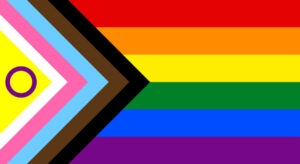
Clinically, I will continue to focus on using my professional skills, identity, and influence to support the mental health and well-being of gay men, just as I have therapist/coach colleagues who specialize in other “niche” populations that need their own specific attention and application of cultural-competency skills within therapy and coaching. It is my honor, and my duty. I challenge others to walk this line, too, where we are both the specific and the collective. Isn’t that what we’re taught as children, about the motto of the United States? It’s not “in God we trust;” that’s Cold War baloney and a perversion of patriotism. It’s about how the parts come together, the individual states and territories to form one nation. It’s right there on our money, and it applies to both the country, and to our LGBT+ community: e pluribus unum: “out of many, we are one.”
If you would like to make the general (like a blog article) into the specific (such as specific help for you), please consider therapy (for California residents) or coaching (in the US or abroad). Would be happy to help. Call or text 310-339-5778, or email Ken@GayTherapyLA.com, for more information or to schedule a session appointment.
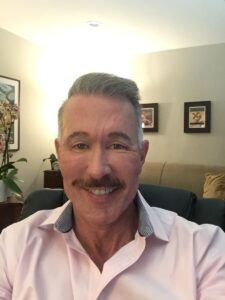 Ken Howard, LCSW, CST, is a Licensed Clinical Social Worker in California, and an AASECT Certified Sex Therapist, and is the most experienced gay men’s specialist therapist in the United States today, with over 29 years experience helping gay men, gay male couples, and other gay male relationships to thrive. He is the author of the books, Self-Empowerment: Have the Life You Want!, and Positive Outlook: Collected Essays for Successfully Living with HIV Today. He lives in West Hollywood, California, with his husband of 19 years, and is a long-term (31 years in 2021) survivor living with HIV/AIDS. He is a former Adjunct Associate Professor at the Suzanne Dworak-Peck School of Social Work, and chaired the LA County HIV Mental Health Task Force for nine years. He is the founder of GayTherapyLA.com, a group practice for psychotherapy and coaching services, based in Los Angeles. He is also the author of the New Adult novel, The Boy from Yesterday, and the composer/lyricist for the musical comedy, On the Boulevard.
Ken Howard, LCSW, CST, is a Licensed Clinical Social Worker in California, and an AASECT Certified Sex Therapist, and is the most experienced gay men’s specialist therapist in the United States today, with over 29 years experience helping gay men, gay male couples, and other gay male relationships to thrive. He is the author of the books, Self-Empowerment: Have the Life You Want!, and Positive Outlook: Collected Essays for Successfully Living with HIV Today. He lives in West Hollywood, California, with his husband of 19 years, and is a long-term (31 years in 2021) survivor living with HIV/AIDS. He is a former Adjunct Associate Professor at the Suzanne Dworak-Peck School of Social Work, and chaired the LA County HIV Mental Health Task Force for nine years. He is the founder of GayTherapyLA.com, a group practice for psychotherapy and coaching services, based in Los Angeles. He is also the author of the New Adult novel, The Boy from Yesterday, and the composer/lyricist for the musical comedy, On the Boulevard.



2 responses to “The Needs of Gay Men in the Volatile “LGBT” Era”
Test Post. Please reply.
Thank you for testing the comment feature of this article. It appears to be working again! 🙂